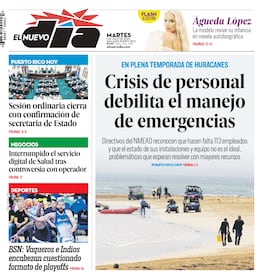Legions of volunteers from non-profit organizations provide critical humanitarian aid in Puerto Rico, and the rest of the world, in the face of the obstacles that government bureaucracy poses to quickly bring assistance to the most vulnerable sectors amid the COVID-19 pandemic and other emergencies.
On World Humanitarian Day, August 19 as declared by the United Nations General Assembly, it is fair to recognize the critical work that volunteers do in providing masks, gloves, cleaning and disinfection products, food, and drinking water to the most vulnerable population.
These organizations and their volunteers work anonymously, without getting any pay and facing big risks posed by the new strain of the coronavirus to bring assistance to poor families and older adults who live alone, often in remote and far to reach communities.
In Puerto Rico, efforts by the third sector to address the needs of poor families strengthened after the disaster caused by Hurricane María in 2017. Since then, many of these efforts have continued and address new challenges like helping earthquake victims. They are also assisting families in poverty, a problem that has been worsening since March as unemployment figures skyrocketed due to the economic blow associated with the COVID-19 pandemic.
This is the same solidarity that we will surely see if atmospheric phenomena like Laura affect communities and families.
Civil society organizations have set an example with their response to the serious social problems Puerto Rico faces – amid a decade-long recession aggravated by government insolvency in turn affected by institutional instability. There are some 5,000 non-profit organizations in Puerto Rico, focused on providing humanitarian aid, as documented last decade.
In other Caribbean countries, humanitarian aid depends more on international NGOs such as Doctors without Borders, Save the Children, Caritas, and the Red Cross that organize constant missions to provide food, water, and relevant assistance for the survival of thousands of people. One of the most important efforts of these legions of good Samaritans is in the neighboring Republic of Haiti.
In Haiti, the poorest country in Latin America and the Caribbean, 4.1 million people, almost 40 percent of the population suffers food insecurity. In difficult conditions, thousands of volunteers from non-profit organizations seek to address hunger and food insecurity like modern heroes in inspiring hard work. Beyond food, they provide medical services, psychological assistance, and education to promote self-management that will lead to a better quality of life in marginalized communities. There are similar humanitarian aid missions in other countries in the Americas and Europe, where they are facing big challenges in refugee camps with COVID-19 outbreaks.
In distant places, as well as in Puerto Rico, it is necessary to promote public policy that helps support the operation of non-profit organizations dedicated to providing aid to the most vulnerable sectors. In this regard, it seems wise to consider legislative proposals that encourage collaboration between these entities, the government, and the private sector.
Nonprofits should also strengthen their operational structures to ensure transparent management dynamics and proper accountability that will make it easier for them to access state and private funds.
According to estimates, at the beginning of the last decade, nonprofits on the island contributed $2.196 billion to the Gross National Product, which shows the importance of their contribution. Today and despite the fiscal crisis, these organizations still have an essential potential in promoting the island's economic and social development.
It is necessary to support the humanitarian efforts of the third sector since they have a crucial role in strengthening Puerto Rico.


